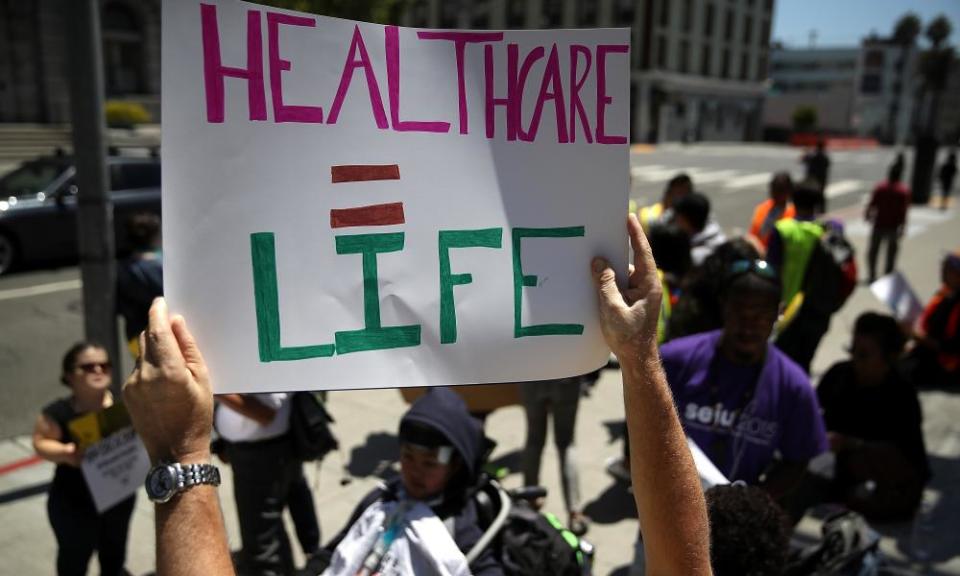Republican healthcare bill: view from West Virginia Trump country

For most Americans, health insurance is not just a nice way to see the doctor – it is the only protection from ruinous medical debt.
But the plan Republican senators aim to pass before the Fourth of July is expected to leave an extra 22 million people – many of them in Appalachian “Trump country” – without health insurance. That puts many members of the Republican base in a bind.
“It’s Washington, they’re not gonna win me over completely no matter what,” said Tommy Fortner, a 58-year-old uninsured electrician, about the Republican plan. Fortner traveled from Georgia for a bluegrass festival in Summersville, West Virginia. As he talked, a man on stage sawed a fiddle.
“I know it’s risky, at my age”, not to have health insurance, he said, but his premiums tripled to about $1,200 per month when the ACA went into effect. Rather than pay for health insurance, he opted to sign his family up for a Christian medical-debt-sharing ministry.
“I’m blessed enough that my family’s took care of,” he said, though he would prefer to have insurance again.
However, the Republican plan is unlikely to help someone like Fortner. Instead, insurers would be allowed to charge older Americans up to five times more than the young, and a reduction in subsidies and insurance regulations could leave Fortner with insurance that is either unaffordable or full of holes.
But he felt politicians had to address the national debt. “They’ve got to do something to get it under control.”
About 49% of Americans get health insurance through their employer. Two more government programs – Medicaid, for the poor and disabled, and Medicare, for the elderly – insure about one-third of Americans. Those that don’t have an employer and don’t qualify for government, such as Fortner, are forced to buy it on the open market.
Tax cuts in the Republican plan would mostly benefit the wealthy and would be paid for mostly by cutting health services to the poor.
The bill would also pull back government spending on healthcare for the middle class, reducing subsidies provided to people who buy their own insurance.
A member of the crowd bobbing his head along to the music, Bill Mossor is a 54-year-old former construction worker, disabled since a dump truck pulled into the path of his Suzuki motorcycle on his way to work. He relies on Medicaid, the health program for the poor to which Republicans are proposing deep cuts. Mossor is one of about 513,000 poor or disabled West Virginians who rely on the program.
But he also felt the cuts were worth it in order to tackle the national debt.
“They want all these things kept in that we just can’t afford to keep in,” he said. He said he would rather “suffer now” and reduce the national debt, so his children “can have it better”.
“Just like we have to cut the music programs,” he said. “I hate to see them cut, but they got to be.”
But opinions at the festival were hardly monolithic.
“It’s my opinion that everyone deserves healthcare,” said George “Peanut” Harper, a 56-year-old musician traveling with the Tennessee Mafia Jug Band, who earlier on was slapping a snare drum on stage.
A country like ours – I don’t understand why people have to struggle so much for healthcare
Jerry Pourbaix, 74-year-old retired coal miner
Wearing overalls and a red baseball hat that said “Make country music great again”, he said he only has insurance because his wife, an accountant, receives coverage through her job.
Harper was traveling with the band because the bass player had recently had a stroke and after three weeks recuperating at Tennessee’s Vanderbilt University hospital was “up to his eyeballs in debt”. The bass player was uninsured when he had the stroke.
“People that don’t have coverage at all – that’s what’s scary,” Harper said.
“A country like ours – I don’t understand why people have to struggle so much for healthcare,” said Jerry Pourbaix, a 74-year-old retired coal miner from West Virginia who lost most of his life’s savings in the stock market during the 2008 crash.
He has worked at Lowe’s, a home improvement store, since the crash. He uses Medicare, a program for over 65s, for insurance. He is among those least likely to suffer from the Republican health bill, but is also among the least supportive.
“I’m not sure the present administration is headed in the right direction,” he said. He estimated that “nine out of 10” people at the festival had voted for Trump, though he went for Clinton. In this part of the country, he said, most people would not “admit” a Clinton vote.
He said he was disturbed by cases of acquaintances who delayed retirement because they needed health insurance, and cited a 62-year-old co-worker who could not afford health insurance if she retired. “It’s all about the insurance,” he said.
“I know case after case like that,” Pourbaix said. “You would think adult people in this country could get together and do something for the people.”

 Yahoo News
Yahoo News 